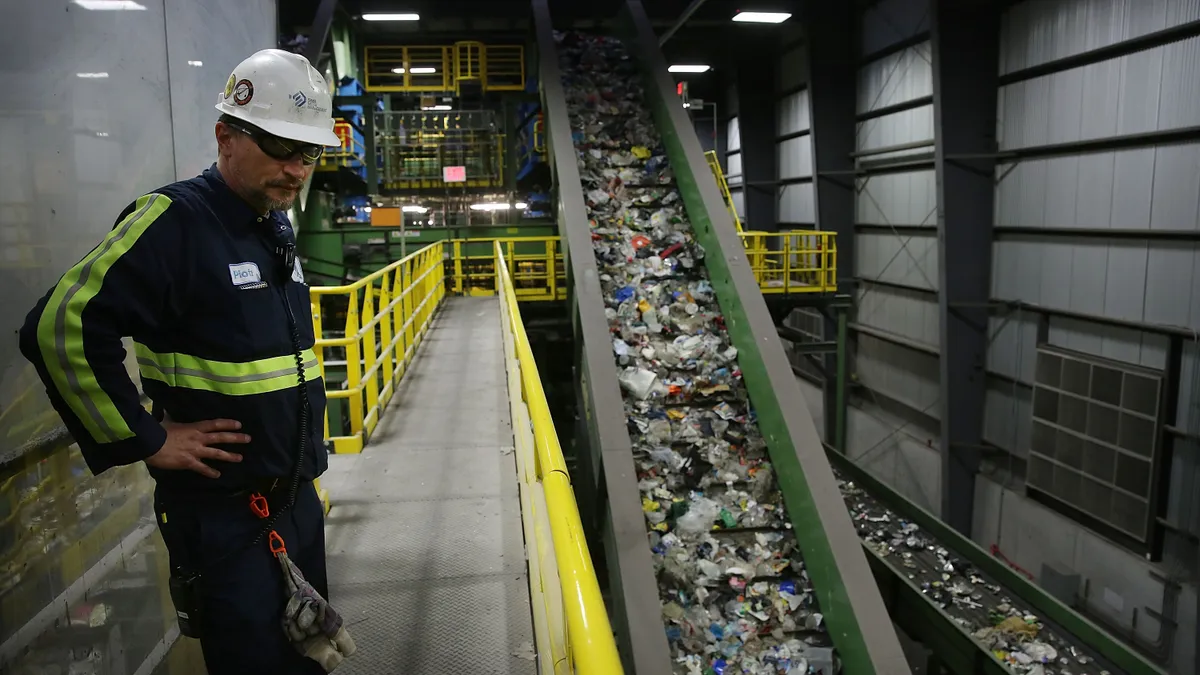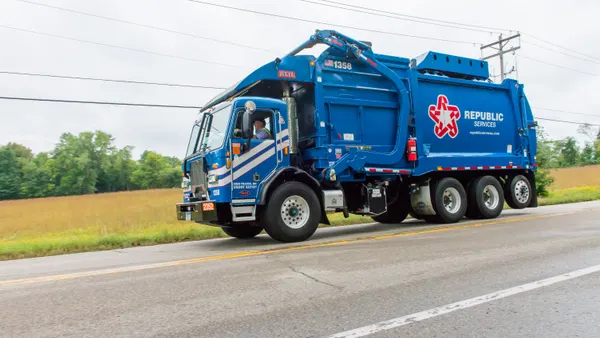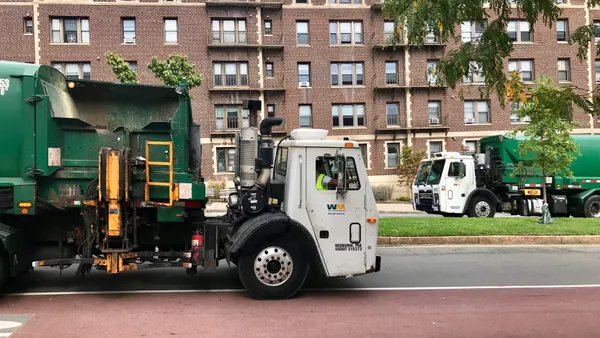UPDATE: March 2, 2022: Investors led by the Closed Loop Leadership Fund, including the Partnership Fund for New York City and the Closed Loop Circular Plastics Fund, recently closed the acquisition of a majority stake in Sims Municipal Recycling (SMR).
Jessica Long, a managing director at Closed Loop Partners, will serve as chairperson of "one of the first majority female-led boards in the industry" at SMR. Tom Outerbridge, SMR's longtime general manager, will serve as president. Key investors in the leadership fund include Nestlé, PepsiCo Beverages North America, Microsoft and Unilever.
Dive Brief:
- A group of investors, including funds managed by Closed Loop Partners, is set to acquire a 50.46% stake in Sims Municipal Recycling (SMR) for $45.4 million, as Marketwatch first reported. New investors will control three of five board seats, according to the Australian Financial Review; the deal could close this quarter.
- "Closed Loop Partners aims to modernize recycling facilities across the U.S. to close the loop on valuable materials and create a waste-free world," said Georgia Sherwin, director of strategic initiatives and communications, via email, adding that the group "will leverage its extensive network" to expand the business into "additional municipalities and additional post-consumer recyclable streams."
- SMR processes an estimated 660,000 metric tons of curbside material per year in the U.S., with operations in Florida, New Jersey and New York. Steve Skurnac, chief development officer for Australian parent company Sims Ltd., said he expects SMR will become a much more "aggressive" competitor for local contracts and said the potential to expand into manufacturing products from recyclables could be a "game-changer."
Dive Insight:
Closed Loop, a New York-based investment firm with backing from numerous high-profile brands and other recycling stakeholders, has supported dozens of companies and initiatives over the years to drive a shift toward a circular economy that it describes as "the most significant restructuring of global commerce since the industrial revolution." This latest transaction, led by Closed Loop and a select group of family investors, marks one of the entity's largest efforts yet to affect U.S. recycling industry competition.
The move can be seen as a natural fit for multiple reasons. Closed Loop CEO Ron Gonen and others have regularly held Sims up as a prime example of a well-run U.S. municipal recycler that doesn't have a disposal business. Closed Loop Managing Director Maite Quinn-Richards previously worked for the company, and Gonen's tenure as a deputy commissioner at New York City's Department of Sanitation (DSNY) overlapped with the opening of Sims' Brooklyn MRF.
According to Skurnac, Closed Loop first approached Sims roughly two years ago, but negotiations were complex, and the pandemic interrupted their progress. Talks restarted early last year, and Sims became more keen on the idea when Skurnac said it saw the "growth potential" of Closed Loop's network.
“They have just a 'who’s who' list of investors, both ESG-based private funds and also quite an impressive roster of original equipment manufacturers in all spaces," said Skurnac, in reference to a wide spectrum of companies involved at every step of the material supply chain from product design to distribution to recycling.
Closed Loop has invested in a variety of MRF upgrades and related projects over the years, but it didn't actively enter the M&A landscape until 2019, when its Leadership Fund purchased an 80% stake in Texas-based recycler Balcones Resources. Balcones then acquired Florida-based Single Stream Recyclers in 2020. Last year, that same Closed Loop fund made a "significant strategic investment" in California-based e-scrap recycler ERI. The SMR deal includes investments by the Leadership Fund as well as the Closed Loop Circular Plastics Fund, which launched last year with backing from major plastic producers such as Dow and LyondellBasell.
While details remain vague about what may be in store for SMR, Closed Loop's Quinn-Richards previously called out "vertical integration into products" as a priority for portfolio companies such as Balcones, and Sims' Skurnac hinted at similar plans. Few companies currently handle both MRF operations and downstream production of materials in the U.S., such as Pratt Industries and Sonoco Recycling, but Skurnac sees Closed Loop's uniquely large roster of big-name partners as a key competitive advantage.
Gonen highlighted the potential he sees to significantly ramp up such circularity efforts in his recent book, "The Waste-Free World," and the investment group said this week in broad terms that the SMR deal is "expected to accelerate the focus" of investors dedicated to "modernizing and growing circular economy infrastructure in the United States."
While Skurnac doesn't anticipate SMR will enter the collection market, at least near term, this transaction could affect the competitive landscape for MRF contracts in some areas.
Skurnac declined to share revenue figures for SMR within the much larger Sims business, but the division has gained a notable presence in the New York City metro area since the early 2000s and is best known for opening one of the country's largest MRFs there in 2013. Other local facilities include two transfer stations in the city as well as a glass processing facility and MRF in New Jersey. The latter facility has been working on upgrades with Closed Loop portfolio company AMP Robotics. SMR has a contract to process residential recyclables for much of New York City, as well as contracts with Jersey City and a handful of other local governments in New Jersey. It also occasionally processes material from haulers in the Long Island area.
More recently, SMR began operating a publicly-owned MRF in Palm Beach County, Florida, in 2019. A similar MRF operating contract could also be awarded in the state's Gulf Coast area. Last year, Sims exited the Chicago residential market by not bidding to retain a city contract and lost out on an operating deal in Connecticut after the local Materials Innovation and Recycling Authority decided to close its MRF rather than make upgrades for ongoing use.
Looking ahead, Skurnac said SMR will be a more active player for municipal processing or operating bids in its current market areas. Building new MRFs is less likely, but it could happen if a contract calls for such an investment.
"Our scale will become a significant competitive advantage as we go forward," he said. "Not to say we’re suddenly going to challenge Waste Management in terms of operating MRFs, but when counties and municipalities are looking for operators I think Sims — with the Closed Loop combination — will be even more attractive to them in terms of being considered a viable, high-end entity.”
As for Sims' largest municipal contract, the 20-year deal with New York, DSNY Press Secretary Vincent Gragnani confirmed that the arrangement is set to run through at least August 2034 and will continue "regardless of ownership status." The city's original contract was awarded to Hugo Neu, which sold a majority stake to Sims in 2005.













